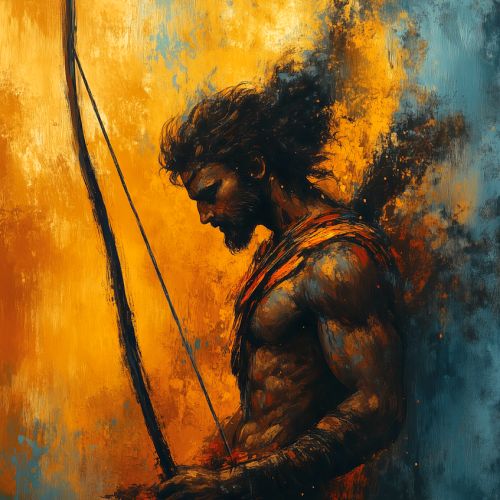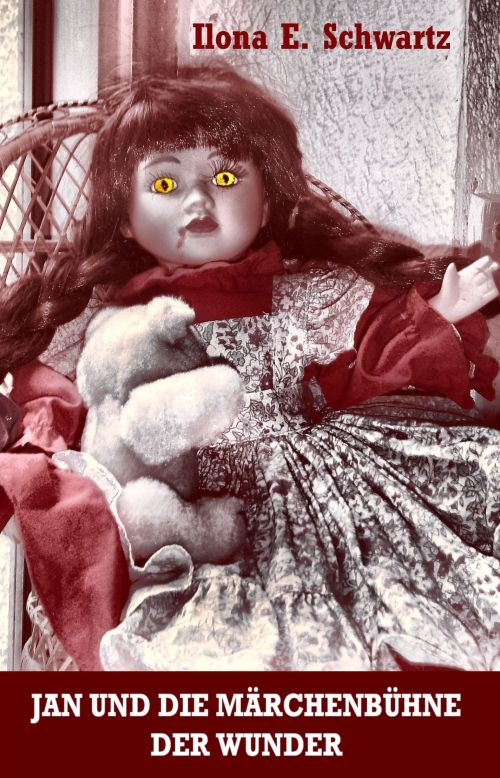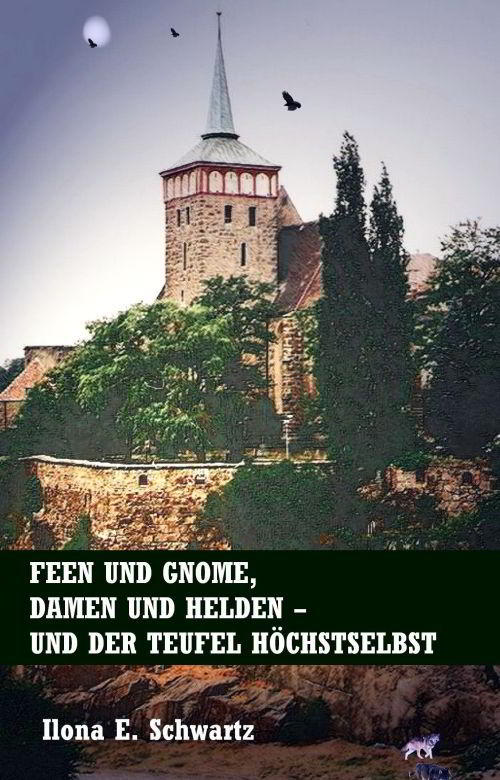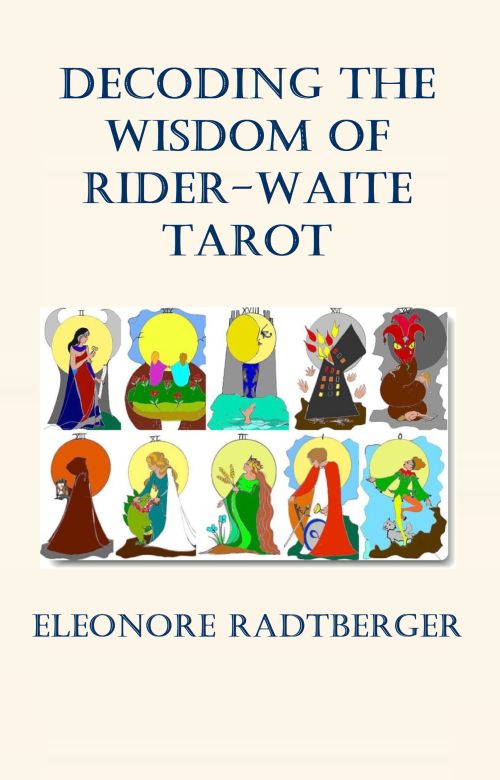
|
The downfall of the Nibelung lineage
A retelling of the Nibelung saga

'This fool, this conceited and vain young fool, does not know what he is doing, nor what he has done.' The tall, darkly dressed man whispers these words in a voice hoarse with rage and pain. The arched window behind him offers a view of the setting sun, which bathes the castle in fiery colours for a few moments.
The man in the black cloak turns his gaze away from this spectacle and stares into the darkness of the corridor. It seems as if he can see things in the darkness around him that no one else can. He sighs heavily, as if he is caught in a waking nightmare.
A bright light snaps him out of his reverie. He notices a group of pages, accompanied by torchbearers, coming down the corridor carrying jugs of some kind. The servants greet him respectfully as they pass, but he does not respond. He follows the group into the illuminated hall, where the entire court has gathered around the set table.
The king waves to him, holding a filled cup, and greets him as though he were a beloved friend or relative. This does not please the gloomy man, as it draws attention to him. He hates these feasts and drinking bouts, but he cannot escape them because of his high position. He bows deeply and takes the filled wine cup from the servant who hurries over. He then greets the king's table and thanks him as briefly as etiquette allows.
No one expects more of him. After all, he is not exactly known as a merry fellow. His idiosyncrasies are respected. Although it would be unthinkable to carry a weapon in the king's hall, yet he never takes off his metal-studded leather armour. His long cloak only partially covers it, but people have grown accustomed to that, too. He even has a reputation for sleeping in his armour.

Peering out from under his half-closed eyelids, he looks around and finds a spot in the shadow of a pillar. The gaunt man settles there, declining the food except for a little bread and taking only a few sips of his drink. He is not here to celebrate. He is here to make a decision. Loud laughter rings out – it's the fair-haired airhead entertaining the company with his jokes.
He tells his stories for the thousandth time, winks at the ladies and flatters the king in his own clumsy way. This child trapped in the body of a strong warrior thinks everything is a game, something that exists only for his entertainment. Everyone is devoted to him. The fair-haired boy who is kind to everyone, whether they are a stable boy or a duke. He is everyone's son and friend, and women throw themselves at him to catch a glimpse of his blue eyes.
He usually wears a light-coloured tunic, and truly looks like a child of the sun. But this is no gentle ray – it dazzles the eyes and ears alike. There is laughter again as the king continues to toast the young upstart. His gaze is already glazed and his words are slightly slurred, as they are almost every evening. The dark-haired woman next to him, the queen, does not laugh with the others. She smiles with pale lips, as if it takes great effort. This has been going on for days, but the king believes her excuse that she has a slight summer fever.
He is weak, the first among his people, and he feels as though his kingship is a cloak he has thrown over himself, but which does not really belong to him. Oaths bind more than chains, yet the quiet man's gaze turns away with some reluctance. The queen is not ill, unless you consider feverish rage and debilitating shame from betrayal to be illnesses.
She has known for days what the king has done to her. The king and that loud, boorish young creep. Like a tavern keeper, he slams his hand on the table, making the cups jump. His somewhat risqué jokes are met with laughter that makes his face redden and his curls stick to his wet forehead. Now, as every evening, he has completed his second heroic deed. This is nothing more than betrayal. No one could have killed the old man, the master of the mountain, without resorting to evil trickery.
The man narrows his eyes to slits as he watches the scene unfold. In his enthusiasm, the blond show-off pushes his chair back to illustrate the fight. The fair-haired innocent lamb with cow-like eyes looks at him as if he were God incarnate. What happened should never have happened. What happened to Odin's daughter was pure violence, and this loud child was merely the king's instrument. Despite his weakness, the king set his sights on something that was never meant for him.
The noble woman's betrayal brought evil into the world and enraged the gods. But the king had dispelled any doubts. He pointed to the pleasure that this deed would bring to the new god. According to the priests, women are subject to men. However, Gunther could not subjugate a woman who was a better fighter than him, and breaking the mistress's will was nothing more than great fun for the strongman.
The fact that he could never have accomplished this without the cloak that concealed him offered only slight satisfaction to the trembling man, who was seething with rage. The unthinkable had happened: the king had taken what did not belong to him. With the murder of the last wise mountain man, the great balance was finally destroyed. It was painful to hear this incredibly stupid brute praise his cowardly murder as a heroic act. In his eyes, he had merely killed an evil lindworm and saved the people. Although the two conspirators against the old order were equally weak – one weak of mind, the other weak of arm – any threat to the throne had to be repelled.
Nevertheless, the twilight of the Nibelung tribe had begun. Oaths did not expire with the downfall, nor with Gunther's betrayal.
The man grimaced as he thought about how easily he had learned from the foolish woman where her husband's only vulnerable spot was located. The unworthy thug had stolen the dragon's spell. The powerful blood spell that made him invulnerable. By chance, there was only one weak spot. A fallen leaf had covered a patch of skin on his shoulder. As before, a blade could pierce this spot.
If he were to strike his spear there during tomorrow's hunt, he would not be doing anything exceptional, as he would merely be complying with the cowardly king. However, he was bound. In his dreams, he saw nothing but flames, blood and death. What had begun with the king's desire would end in the tribe's destruction. He would perish with them, for his time was over. He longed for the days when a king had to prove he had a strong arm and a clear mind, binding his blood to that of his people and theirs to his own.
But a new era had dawned – one belonging to the priests, in which the old ways were consigned to history. Weary of fighting and intrigue, he would find it easy to leave. While he would preserve his honour, the others had lost theirs long ago.
Hagen of Tronje left the hall unnoticed, preparing for the next day. That night marked the beginning of the end.
© 'The downfall of the Nibelung lineage. A retelling of the Nibelung saga': A short story by Pressenet (translated by Izabel Comati), 09/2025. Image credit: Mythological figure, CC0 (Public Domain Licence).
– With the language of flowers: Let flowers speak
– The flying jug of Timevalley. A fantastic story from another world
– The Four Elements and their Importance in Spiritual Life
Discover more articles! Use the search function:
English archive:
More reviews, book presentations and essays
2024/2025
German archive:
2024 |
2023 |
2022 |
2021 |
2020 |
2019 |
2018 |
2017 |
2016 |
2015 |
2014 |
2013 |
2012 |
2011 |
2010 |
2009
Become a writer for Pressenet! Write articles for our online magazine on trending topics such as best books to read, health and wellness, technology and gadgets, business and finance, travel and tourism, lifestyle and fashion or education and career. Info: Become an author
Sponsors and investors are welcome: If you found our articles interesting, we would be grateful for a donation. Please also recommend us to your networks. Thank you very much!
Sitemap About Privacy Policy RSS Feed





